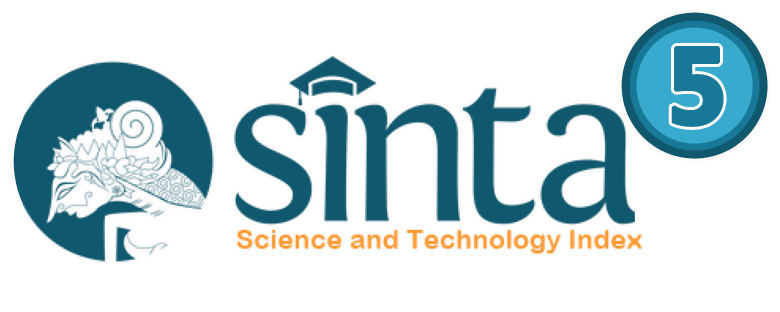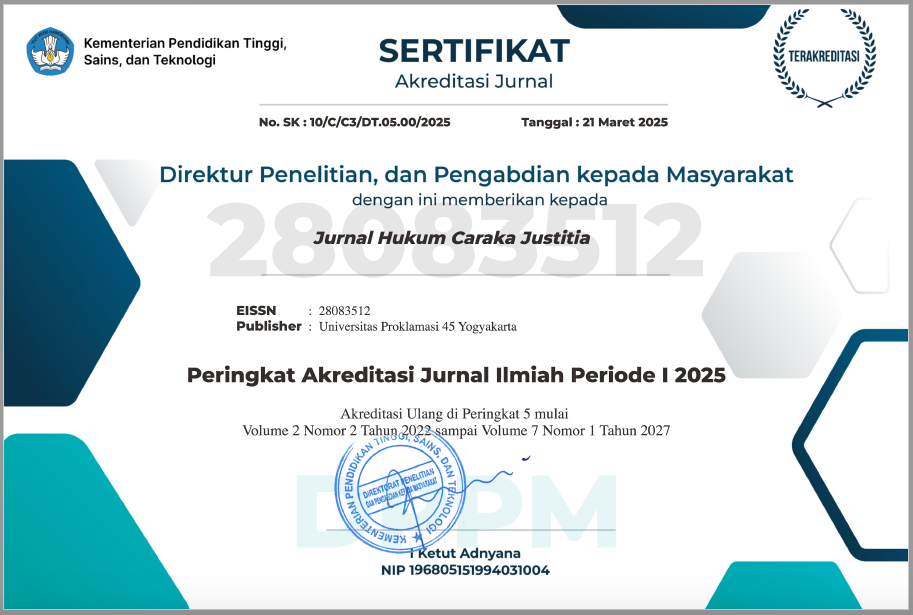Efektivitas Penerapan Konsinyasi dalam Pemberian Ganti Rugi Pengadaan Tanah
DOI:
https://doi.org/10.30588/jhcj.v3i1.1508Keywords:
Land Acquisition, Compensation and Consignment.Abstract
The land is one of the natural assets controlled by the State of Indonesia as stipulated in Article 33 paragraph (3) of the 1945 Constitution. The word control has the meaning of being authorized to regulate by issuing statutory regulations. Even so, land problems are still a problem that often occurs in society, especially related to land acquisition for public purposes and accompanied by compensation. The purpose of this study is to the extent to which the effectiveness of the application of consignment in the provision of compensation due to land acquisition. The research method in this writing uses a normative juridical approach and data analysis used is qualitative and data collection is carried out by collecting primary, secondary, and tertiary materials.
Based on the results of the analysis of this writing, the application of consignment in the provision of compensation for land acquisition can be the final way in resolving disputes between the government/institution/agency and the community when there is no agreement due to various factors such as the owner or heirs not being present and difficult to communicate related with land acquisition for public interest or this disagreement is due to the absence of an agreement on the amount of compensation in which compensation for land acquisition is considered too small so that it cannot meet further needs. The consignment request is carried out by the Debtor/Agency/Institution/Government to deposit compensation money through the local District Court and of course, use the applicable provisions as stipulated in the Law so that it has permanent legal force.
References
Artikel Jurnal
Manurung, Shelvi, et al. “Problematika Konsinyasi Pengadaan Tanah Pembangunan Jalan Tol Krian Legundi Bunder Di Kabupaten Gresik”. Jurnal Tunas Agraria 2, no. 1 (Januari 2019): 141-171. https://www.jurnaltunasagraria.stpn.ac.id/index.php/JTA/article/ download/21/38.
Wahanisa, Rofi. “Pencabutan Hak Atas Tanah dan benda Yang Ada Diatasnya (Revocation of Interest in Land and Property: A Grey Area)”. Jurnal Rechtsvinding 8, no. 3 (Desember 2019): 443-459. https://rechtsvinding.bphn.go.id/artikel/8.%20Rofi%20Wahanisa.pdf.
Buku
Hanintjo, Soemitro Rony. Metodologi Penelitian Hukum. Jakarta: Ghalia Indonesia, 1983.
Hidayat, Arief. Kebebasan Berserikat Di Indonesia (Suatu Analisis Pengaruh Perubahan Sistem Politik Terhadap Penafsiran Hukum). Semarang: Badan Penerbit Universitas Diponegoro, 2006.
MSW, Sumardjono. Dinamika pengaturan pengadaan tanah di Indonesia: dari Keputusan Presiden sampai Undang-Undang. Yogyakarta: Gadjah Mada University Press, 2015.
Soekanto, Soerjono. Penelitian Hukum Normatif Suatu Tinjauan Singkat, Jakarta: Raja Grafindo, 2001.
Sunggono, Bambang. Metodologi Penelitian Hukum. Jakarta: Raja Grafindo Persada, 2003.
Internet
Badan Pembinaan Ideologi Pancasila Republik Indonesia. ”Arti Pancasila Sebagai Paradigma Pembangunan”. https://bpip.go.id/berita/1035/578/arti-pancasila-sebagai-paradigma-pembangunan.html (diakses 30 April 2023).
Badan Pengembangan & Pembinaan Bahasa. “Kamus Besar Bahasa Indonesia VI Daring”. https://kbbi.kemdikbud.go.id/entri/konsinyasi (diakses 30 April 2023).
Direktorat Jenderal Badan Peradilan Umum Pengadilan Negeri Pulang Pisau. “Tahap Permohonan Konsinyasi”. https://www.pn-pulangpisau.go.id/AVuGACYF6oLkZWBcxXg Dp4s0OP1Il2iRK9zjTMNrEmf5wSa8d3-yH7vq JUthbQen (diakses 30 April 2023).
S, Naffi. “Bagaimana Konsinyasi Menurut Pasal 1404-1412 KUH Perdata”. https://badilag.mahkamahagung.go.id/artikel/publikasi/artikel/bagaimana-konsinyasi-menurut-Pasal-1404-1412-kuh-perdata-oleh-naffi-s-ag-m-h-3-7 (diakses 28 April 2023).
Peraturan Perundang-Undangan
Kitab Undang-Undang Hukum Perdata.
Undang-Undang Nomor 5 Tahun 1960 tentang Peraturan Dasar Pokok-Pokok Agraria.
Undang-Undang Nomor 2 Tahun 2012 tentang pengadaan tanah bagi pembangunan untuk kepentingan umum dengan UU Nomor 20 Tahun 1961 tentang Pencabutan Hak-Hak atas tanah dan benda-benda.
Peraturan Mahkamah Agung Nomor 3 Tahun 2016 tentang Tata Cara Pengajuan Keberatan dan Penitipan Ganti Kerugian Ke Pengadilan Negeri dalam Pengadaan Tanah Bagi Pembangunan Untuk Kepentingan Umum.
Peraturan Mahkamah Agung tentang Nomor 2 Tahun 2021 tentang Perubahan Atas Peraturan Mahkamah Agung Nomor 3 Tahun 2016 tentang Tata Cara Pengajuan Keberatan dan Penitipan Ganti Kerugian Ke Pengadilan Negeri Dalam Pengadaan Tanah.
Edaran Ketua Mahkamah Agung Republik Indonesia Ketua Mahkamah Agung Republik Indonesia Nomor 2 Tahun 2021 tentang ketentuan Tenggang Waktu Penyelesaian Permohonan Penitipan Ganti Kerugian Berdasarkan Peraturan Mahkamah Agung Nomor 3 Tahun 2016 tentang Tata Cara Pengajuan Keberatan dan penitipan Ganti Kerugian Ke Pengadilan Negeri dalam Pengadaan Tanah Bagi Pembangunan untuk Kepentingan Umum.
Downloads
Published
How to Cite
Issue
Section
License
Copyright (c) 2023 Lucia Setyawahyuningtyas

This work is licensed under a Creative Commons Attribution 4.0 International License.
Authors who publish with JHCJ agree to the following terms:
Authors retain copyright and grant the JHCJ right of first publication with the work simultaneously licensed under a Creative Commons Attribution 4.0 International License that allows others to share (copy and redistribute the material in any medium or format) and adapt (remix, transform, and build upon the material) the work for any purpose, even commercially with an acknowledgment of the work's authorship and initial publication in JHCJ.
Authors are able to enter into separate, additional contractual arrangements for the non-exclusive distribution of the journal's published version of the work (e.g., post it to an institutional repository or publish it in a book), with an acknowledgment of its initial publication in JHCJ. Authors are permitted and encouraged to post their work online (e.g., in institutional repositories or on their website) prior to and during the submission process, as it can lead to productive exchanges, as well as earlier and greater citation of published work (See The Effect of Open Access).














